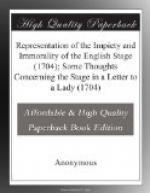give their Minds quite a wrong Biass, and disarm them
of that Severity which is their greatest Guard,
and which, when once lost, leaves ’em an easie
Prey to every Temptation? Will not those Lewd
Scenes of Love, wherewith almost every Play is
fraught, inflame the Fancy, heighten the Imagination,
and render a Person thus prepar’d, a fit Subject
for ill designing People to work on? But suppose
it were possible to be so armed as to be Proof against
all these Dangers; yet let any that have the least
Regard to what is Serious, tell me how they
can answer it to God, or their own Consciences,
to be any ways Instrumental towards the Support
of so much Wickedness? Do they think it a Sin
to give the least Encouragement to Vice, and at the
same time believe themselves Innocent, when
by their Persons, and their Purses,
they contribute to the cherishing the very Seed-Plot
of Irreligion? ’Tis to no purpose for such
to say, That they are cautious what Plays they see,
and always go to the best and that the Play-Houses
would thrive whether they frequented them or no.
This may he true, but what then, Will this excuse them?
Suppose a powerful Rebellion is begun in a
Nation, and carried on successfully, for some
time; and a Man should not only appear sometimes among
the Rebels, but should, now and then, send them a
Supply (tho’ never so little) of Money
and Arms: Could such a one pretend that he was
no ways Instrumental in this Rebellion, nor
Accessary to the Mischiefs that attended it, and that
because it was not only begun, but would have
prosper’d too, without him; and altho’
he did sometimes appear among the Authors of it, yet
it was with the Party which did the least Mischief?
Do you think, Madam, this a just way of Reasoning?
I dare say you do not. Is not this then the very
Case I am speaking of? Is the Stage, as
’tis now manag’d, any thing else but a
downright Rebellion against God and his Holy Religion?
Are not the Plays, (if not by Design) yet by a natural
and necessary Consequence, an undermining of
his Laws, and an Attempt upon his Government?
And must it not then follow, that every one
that frequents them, is a Party in the Cause,
and encourages the Undertaking? And tho’
he should be so Happy as never to smile at a Prophane
Jest, nor join in Applauding a Vitious
Play; yet, will that exempt him from a Share of that
Guilt which his Presence and Purse has help’d
to support? No, Madam, ’tis Numbers
strengthen the Enemy, and give fresh Courage to his
Attempts! A Full House is the very Life
of the Stage, and keeps it in Countenance, whereas
thin Audiences would, in time, make it dwindle
to nothing.




